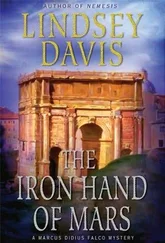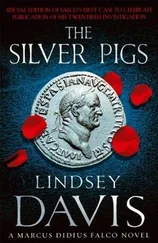Lindsey Davis - The Ides of April
Здесь есть возможность читать онлайн «Lindsey Davis - The Ides of April» весь текст электронной книги совершенно бесплатно (целиком полную версию без сокращений). В некоторых случаях можно слушать аудио, скачать через торрент в формате fb2 и присутствует краткое содержание. Год выпуска: 2013, ISBN: 2013, Издательство: Minotaur Books, Жанр: Исторический детектив, на английском языке. Описание произведения, (предисловие) а так же отзывы посетителей доступны на портале библиотеки ЛибКат.
- Название:The Ides of April
- Автор:
- Издательство:Minotaur Books
- Жанр:
- Год:2013
- ISBN:9781250023698
- Рейтинг книги:3 / 5. Голосов: 1
-
Избранное:Добавить в избранное
- Отзывы:
-
Ваша оценка:
- 60
- 1
- 2
- 3
- 4
- 5
The Ides of April: краткое содержание, описание и аннотация
Предлагаем к чтению аннотацию, описание, краткое содержание или предисловие (зависит от того, что написал сам автор книги «The Ides of April»). Если вы не нашли необходимую информацию о книге — напишите в комментариях, мы постараемся отыскать её.
The Ides of April — читать онлайн бесплатно полную книгу (весь текст) целиком
Ниже представлен текст книги, разбитый по страницам. Система сохранения места последней прочитанной страницы, позволяет с удобством читать онлайн бесплатно книгу «The Ides of April», без необходимости каждый раз заново искать на чём Вы остановились. Поставьте закладку, и сможете в любой момент перейти на страницу, на которой закончили чтение.
Интервал:
Закладка:
Some years I went away. My family owned a villa on the coast.
This year there was a big auction in which Father was involved, so the others were not going to the sea until later, and they wanted me to stay in Rome too. Ever since I was widowed, it had been understood I would be with them at this time. Our family had almost as many ritual days as the city had festivals, and the Ides of April was a compulsory engagement for me. In an unstated way, they had made it conditional on their allowing me to be independent the rest of the time. The thirteenth day of April, during the Cerialia, was my birthday. On the Ides, I had to be with them.
Oh let's get this out of the way.
Nobody really knows when I was born, nor who my parents were. No one will ever know. Being an informer now, in a family of investigators, made no difference. I could never find out. Even I had accepted years ago that a search would be a waste of time. I would never go back to Britain. There was nothing for me there. Not even the truth.
I was discovered as a crying baby in the streets of Londinium, that ramshackle shanty town at the mist-covered end of the world. I had been abandoned, or perhaps hidden for safety, when the Boudiccan tribes attacked and burned the Roman settlement. There were few important officials in Britannia in Nero's day; it was a new, very remote, province. I was unlikely to be an official's baby or my loss would have been noted. There were soldiers, but soldiers were not supposed to have families and in a rebellious frontier province that rule tended to be enforced. The most likely possibility is that I was a trader's child, which meant I could be of any nationality, or half and half, with my mother possibly British though just as likely not.
Orphaned babies plucked from horror tend to be hailed as miracles. They give hope at a time of chaos and grief. People fostered me. My childhood was spent among shopkeepers. These slipshod, uneducated people, emigrants from mainland Europe, were decent to me, until caring for an extra infant and feeding an extra mouth became burdensome. I began to sense they had ideas of selling me into one kind of slavery or another, so I ran away. I was a skinny, bitter, unwanted street-child who slept in chilly colonnades, handed as many blows as curses.
Finally, more compassionate people saw me there and saved me.
Didius Falco and Helena Justina, my new, cultured, adventurous, warm-hearted and eccentric parents, certainly did not object to a challenge; by then I was undomesticated, vermin-ridden and although we never talked about it afterwards, I had been targeted by a brothel-owner and raped. I was aggressive and angry, too-moods I never really lost. But I also yearned for survival. I recognised a chance. Never stupid, I took it.
I came to Rome. A diploma of Roman citizenship had been arranged for me. I agreed to be formally adopted (my rescuers had principles; they gave me the choice). Birthdays are important in Roman families and I was encouraged to choose a date we could call my own. Since the Boudiccan Rebellion had happened in the autumn, and by then I had survived without a mother, spring seemed a likely time for me to have been born. Father's birthday was in March; I selected a date three weeks after his, time for us to recover from one family party and arrange the next. I chose the Ides of April before ever I knew anything about the foxes.
They came in from the country, following the great highways, sneaking at dusk up through the roadside ditches along the Via Latina, the Via Appia and the Via Ostiensis. They came to raid rubbish piles and detritus in gutters. They knew the places in the city where poultry was kept in cages, ready for butchers' shops or market stalls: ducks, hens, pheasants, geese, even occasional exotics like peacocks or flamingos. They ate mice. Occasionally they snatched puppies or kittens, or tame doves; certainly they carried off the corpses of dead pets, and also rats and pigeons. Perhaps sometimes they would scoop a fancy lamprey from a garden pond. They licked fish skins and skeletons; picked through rabbit bones; ran off, weighed down lopsidedly with meat carcasses in their mouths; skulked around butchers' stalls, licking the blood on the streets; snatched the remains of religious offerings from outdoor altars. After a night's foraging, most probably scampered back to their dens on the open Campagna, the agricultural plain surrounding Rome. Others stayed. I knew that because I recognised at least one animal at the Armilustrium. I had seen him a few times; I knew the size and shape of him, and his regular habits. The time of evening when he visited the walled enclosure. How he paused, ears up, to check for safety. How he slipped along in shadow, almost impossible to see unless your eyes were keenly used to the darkness and spotted slight movements. He must have made a lair somewhere. I called him Robigo. It's the name for wheat rust.
Some nights I slipped out to the Armilustrium with a bowl of scraps and fed him. He had learned that I would come. If I stayed long enough, I might see him. I had learned to look for his ears, pricked up as he crouched on the top of the enclosure wall, waiting and watching until he felt secure. Then he slid down the full height of the wall, tail at full stretch, vanishing into shadow. I had to strain my eyes to find his movements. Keeping close to the wall, he would approach the bowl, with his neat tread and constant hesitation. He sniffed, he ate. The way he took food was surprisingly dainty. He made domestic dogs look like untidy gluttons.
Any slight sound would send him silently melting back into cover. But soon he would creep out again, returning until the whole bowl of food was eaten.
He liked pies, with gravy, or other broths. He thought dry grains were an insult. In many ways his appetite was the same as mine.
Once, a piece of fish I put out for him must have been dangerously rotten. Robigo lifted it out delicately and laid it on the grass a stride away, before returning to the bowl and finishing the other scraps.
He never acknowledged my presence. I knew I was communing with Nature, while Nature remained aloof.
Maybe the fact that I had been nearly burned alive myself in the firestorm that destroyed Londinium made me so angry about the torches and terror that the devotees of Ceres perpetrated on the Aventine foxes. The foxes were like me. Private, ruthless and self-sufficient. Intelligent and untameable, yet capable of strong loyalty. Loners who could socialise, joyously and playfully, but afterwards slip back into being reclusive.
We all lived within the city community, yet surreptitiously. We were never truly part of it.
IX
Informers have ridiculous rituals. One is that if anyone connected with a case dies, especially if it is your client, you must go to the funeral. Everyone pretends this action symbolises our good nature and fine feelings. Diligent nurses brought us up from the cradle to have elegant manners. We not only sympathise with the bereaved, we ourselves are troubled souls who share their sorrow…
The real reason is a myth-nothing more, believe me-the myth that you chance seeing the perpetrator wailing beside the pyre. Sometimes they are indeed present, if only because most murders are committed by a member of the victims family. If so, you can give up immediately. The person you are looking for has exactly the same snub nose and bad breath as all of their innocent relatives, and the same gormless expression. If they brazen it out, you will never home in on the guilty and catch them.
The funeral myth presupposes your killer is an idiot, who will be drawn to the scene, yearning to witness the grim results of their crime and daring you to identify her or him. It also implies informers have powers of prophecy and can tell, without using spells or magic talismans, exactly which of the off-putting mourners is really going crazy with guilt.
Читать дальшеИнтервал:
Закладка:
Похожие книги на «The Ides of April»
Представляем Вашему вниманию похожие книги на «The Ides of April» списком для выбора. Мы отобрали схожую по названию и смыслу литературу в надежде предоставить читателям больше вариантов отыскать новые, интересные, ещё непрочитанные произведения.
Обсуждение, отзывы о книге «The Ides of April» и просто собственные мнения читателей. Оставьте ваши комментарии, напишите, что Вы думаете о произведении, его смысле или главных героях. Укажите что конкретно понравилось, а что нет, и почему Вы так считаете.












